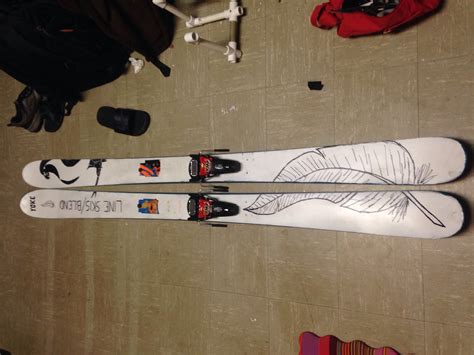How To Repaint Skis
Ronan Farrow
Apr 02, 2025 · 3 min read

Table of Contents
How to Repaint Your Skis: A Step-by-Step Guide to a Fresh Look
So, your skis have seen better days. Maybe they're scratched, faded, or just plain boring. Don't despair! Repainting your skis is a surprisingly achievable project that can breathe new life into your winter gear and give them a unique, personalized look. This guide will walk you through the process, from prep to final touches. Get ready to hit the slopes with style!
Before You Begin: Gathering Your Supplies
Before diving in, gather all the necessary materials. Proper preparation is key to a successful repaint. Here's what you'll need:
- Sandpaper: Various grits (e.g., 80, 120, 220) for smoothing and prepping the ski surface.
- Painter's tape: To mask off areas you don't want painted.
- Tack cloth: To remove dust and debris after sanding.
- Primer: Specifically designed for plastics and metal. This ensures better paint adhesion.
- Paint: Choose a durable, outdoor-rated paint suitable for plastics. Consider specialized ski paint for optimal performance. Experiment with colors and designs to match your style.
- Clear coat: A protective layer to seal the paint and add durability. Look for UV-resistant clear coat for longevity.
- Paintbrushes or spray cans: Choose the application method that best suits your comfort level and the complexity of your design.
- Gloves: Protect your hands.
- Drop cloths or newspaper: Protect your workspace.
- Safety Glasses: Essential for protecting your eyes.
- Masking fluid (optional): For creating intricate designs.
- Razor blades/putty knife (optional): For carefully removing existing graphics.
Step-by-Step Repainting Process
Now let's get to the fun part!
1. Preparation is Key: Cleaning and Sanding
Thoroughly clean your skis with soap and water, removing any dirt, wax, or old decals. Allow them to dry completely. Then, carefully sand the surface using progressively finer grits of sandpaper. This creates a textured surface that promotes better paint adhesion. Don't overdo it; you just need to scuff up the surface slightly. Finish by wiping with a tack cloth to remove any dust particles.
2. Masking and Protecting: Precise Application
Apply painter's tape carefully to any areas you want to protect, such as the edges, bases, and bindings. Remember to use a sharp knife to carefully remove any old decals before sanding. If necessary, consider using masking fluid for intricate designs.
3. Priming for Perfect Adhesion
Apply a thin, even coat of primer, following the manufacturer's instructions. Allow it to dry completely before moving on to the next step. This step is crucial for preventing peeling and chipping.
4. Painting Your Masterpiece
Once the primer is dry, apply your chosen paint. For best results, apply several thin coats, allowing each to dry completely before applying the next. This method prevents drips and ensures even coverage. If using spray paint, apply light coats from a consistent distance, keeping the can moving constantly to prevent runs.
5. Sealing the Deal: Applying the Clear Coat
After the paint is completely dry, apply several thin coats of clear coat. This protects your beautiful new paint job from scratches and UV damage. Allow the clear coat to dry completely before handling.
6. Final Touches: Removal and Inspection
Once everything is dry, carefully remove the painter's tape. Inspect your work for any imperfections and touch them up as needed. Let it cure for at least 24 hours before using them to ski.
Tips for Success: Achieving Professional Results
- Ventilation: Work in a well-ventilated area, especially when using spray paint.
- Patience: Allow ample drying time between coats to prevent issues.
- Thin Coats: Multiple thin coats are always better than one thick coat.
- Practice: If you're unsure about your design, practice on a scrap piece of plastic first.
By following these steps, you'll be able to successfully repaint your skis and enjoy a unique, personalized look on the slopes. Happy skiing!
Featured Posts
Also read the following articles
| Article Title | Date |
|---|---|
| How To Remove Scratches From Car Wash | Apr 02, 2025 |
| How To Test Rear Window Defogger | Apr 02, 2025 |
| How To Prove Cohabitation In California | Apr 02, 2025 |
| How To Refurbish Aluminum Wheels | Apr 02, 2025 |
| How To Run Ductwork Between Floors | Apr 02, 2025 |
Latest Posts
-
How Do Dentists Remove A Crown
Apr 04, 2025
-
How Do Defensive Coordinators Call Plays
Apr 04, 2025
-
How Do Deer Find Corn
Apr 04, 2025
-
How Do Deer Feeders Work
Apr 04, 2025
-
How Do Dealerships Protect Cars From Hail
Apr 04, 2025
Thank you for visiting our website which covers about How To Repaint Skis . We hope the information provided has been useful to you. Feel free to contact us if you have any questions or need further assistance. See you next time and don't miss to bookmark.
